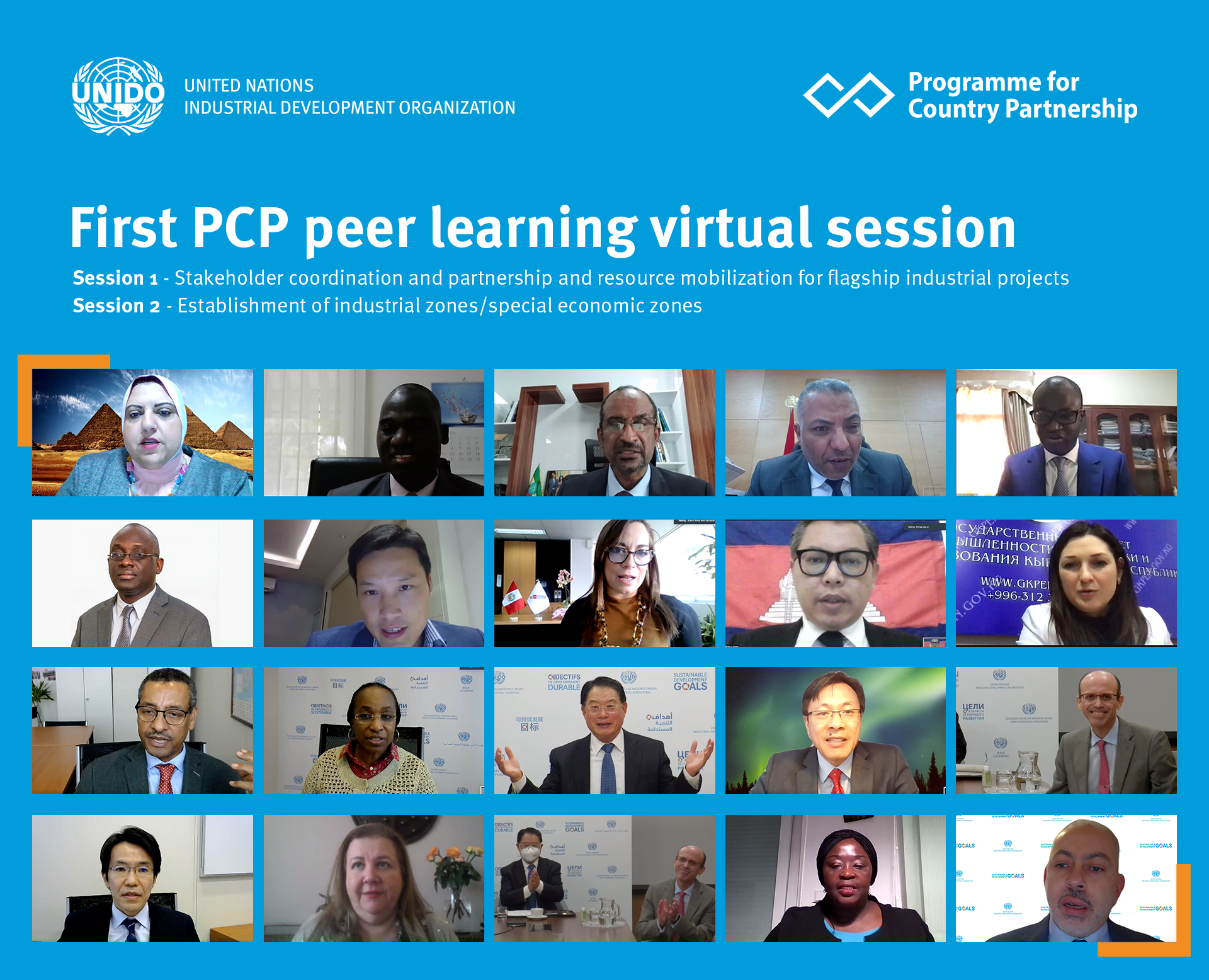UNIDO Programme for Country Partnership countries share experiences and lessons learned
02 February 2021

VIENNA, 2 February 2021 - The United Nations Industrial Development Organization (UNIDO) has organized the first peer learning session on the Programme for Country Partnership (PCP) for high-level representatives of current PCP countries and those interested in the PCP model. The session focused on stakeholder coordination, partnerships and resource mobilization, as well as the establishment of industrial parks as key to advancing inclusive and sustainable industrial development (ISID) within the framework of the PCP.
During the session, UNIDO Director General, LI Yong, stressed that "the most important elements of the PCP model are strong government leadership, a strong coordination mechanism with the participation of the public and private sector, and a multi-stakeholder partnership; these are imperatives for advancing ISID.”
“Having this opportunity to share experiences, examples and lessons learned among PCP countries, in my view, will help enhance the Programmes’ effectiveness in the future,” said Li.
The workshop was a direct response to Member States’ wishes to exchange experiences and learn from each other on the PCP approach, further emphasized through a resolution adopted at the eighteenth session of the UNIDO General Conference in November 2019. It was attended by, among others, representatives of Permanent Missions and governments from all the PCP countries − Cambodia, Côte d’Ivoire, Ethiopia, Egypt, Kyrgyzstan, Morocco, Peru, Rwanda, Senegal, Tanzania and Zambia –with an online audience of 500 participants.
Government representatives from the first PCP pilots, Ethiopia and Senegal, presented their experience and success factors throughout the implementation phase, with a particular focus on flagship projects. Other PCP countries were also invited to share their experiences through concrete examples, and engage in Q&A with the panellists.
Teka Gebreyesus, Ethiopia’s State Minister of Trade and Industry, underlined his government’s commitment and determination to institutionalize and mainstream the PCP, its approach and its lessons. He said, “The PCP Ethiopia is a resounding success. In its quest to build an industrial economy, the Government of Ethiopia is aware of the indispensable role that partners, especially UNIDO, can play in the future as the repository of technical know-how and expertise in this sector.”
Representing Senegal, Adama Ndiaye from the Ministry of Industrial Development and Small and Medium Industries noted that the PCP has set up a mechanism for public-private dialogue and helped to mobilize technical and financial partners for industrial parks and special economic zones (SEZs), namely through feasibility studies. “The PCP is an accelerator of the industrialization process. It has enabled Senegal to have a project portfolio of 27 industrial parks and SEZs, as each agro-pole to be established will have at least four industrial parks within it.”
Sharing Cambodia’s experience, Chea Kok Hong from the Ministry of Economy and Finance, discussed some of the challenges and lessons learned in the development of Sihanoukville, one of Cambodia’s largest SEZs.
Representing one of the newer PCP countries, Egypt, Abir El-Saady from the Ministry of Trade and Industry noted that the PCP approach is unique as it follows the whole-of-government approach. Similarily, Juana Rosa Ana Balcázar Suárez of the Ministry of Production of Peru, highlighted the PCP’s alignment with national development policies, as well as the important element of inter-ministerial coordination.
Côte d’Ivoire added its perspective as Emmanuel Tra Bi from the Ministry of Trade and Industry described the PCP’s coordination mechanism, and emphasized that the new PCP is being developed in line with the country’s new development plan for 2021-2025 and the new United Nations Sustainable Development Cooperation Framework for that same period.
Mushuma Mulenga from the Government of Zambia and Taoufiq Moucharraf from the Government of Morocco also took the floor to provide insights on their countries’ national development priorities in relation to the PCP, as well as the importance of having a contingency plan in the wake of the COVID-19 pandemic.
In addition to PCP representatives, UNIDO experts contributed their views and technical expertise to the session, including on the country diagnostic, a key component of PCP development and the identification of priority sectors and areas. The Organization will facilitate additional peer learning sessions in 2021 and beyond, expanding on the experience-sharing countries, topics and participants.
For more information about the session, including the speakers’ presentations, visit the event page here.
For additional information, please contact:
ZHAO Jie, UNIDO Industrial Development Officer and Coordinator for South-South and Triangular Cooperation